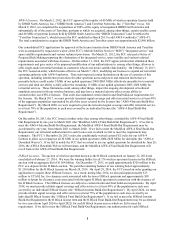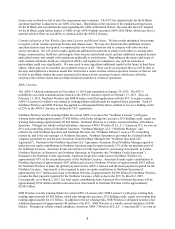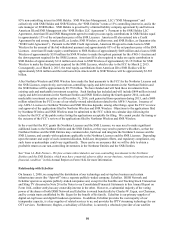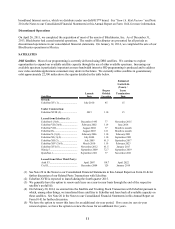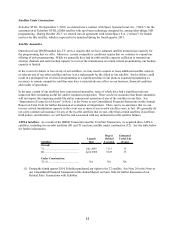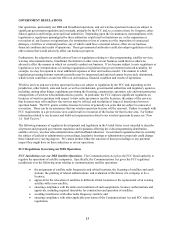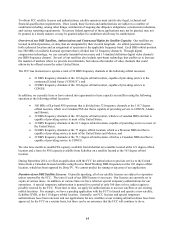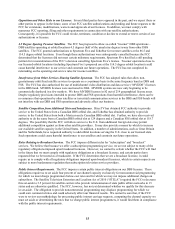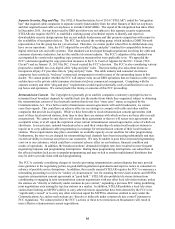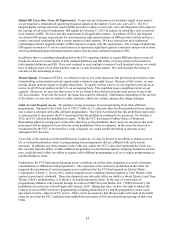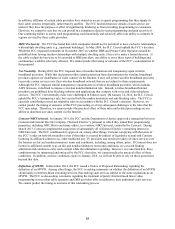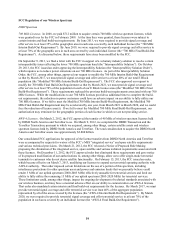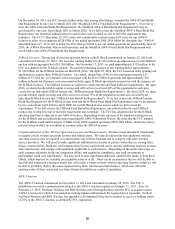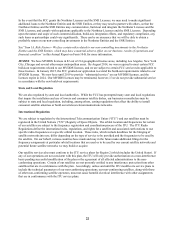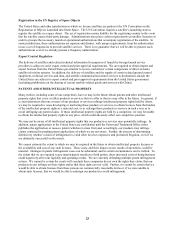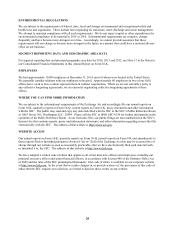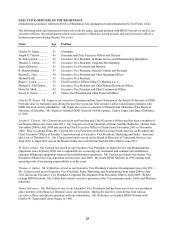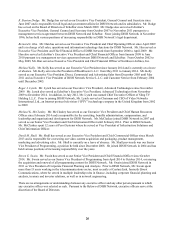Dish Network 2014 Annual Report Download - page 26
Download and view the complete annual report
Please find page 26 of the 2014 Dish Network annual report below. You can navigate through the pages in the report by either clicking on the pages listed below, or by using the keyword search tool below to find specific information within the annual report.16
16
Separate Security, Plug and Play. The STELA Reauthorization Act of 2014 (“STELAR”) ended the “integration
ban” that required cable companies to separate security functionality from the other features of their set-top boxes
and that required leased cable set-top boxes to include CableCARDs. The repeal of the integration ban takes effect
in December 2015. Set-top boxes used by DBS providers were not subject to this separate security requirement.
STELAR also requires the FCC to establish a working group of technical experts to identify and report on
downloadable security design options that are not unduly burdensome and that promote competition with respect to
the availability of navigation devices. The FCC has selected the working group, which includes a DISH Network
representative, but the group has not yet convened. Therefore, we cannot predict what effect its deliberations may
have on our operations. Also, the FCC adopted the so-called “plug and play” standard for compatibility between
digital television sets and cable systems. That standard was developed through negotiations involving the cable and
consumer electronics industries, but not the satellite television industry. The FCC’s adoption of the standard was
accompanied by certain rules regarding copy protection measures that were applicable to us. We appealed the
FCC’s decision regarding the copy protection measures to the U.S. Court of Appeals for the D.C. Circuit (“D.C.
Circuit”) and on January 15, 2013 the D.C. Circuit vacated the FCC’s decision. The FCC is also considering various
proposals to establish two-way digital cable “plug and play” rules. That proceeding also asks about means to
incorporate all pay-TV providers into its “plug and play” rules. The cable industry and consumer electronics
companies have reached a “tru2way” commercial arrangement to resolve many of the outstanding issues in this
docket. We cannot predict whether the FCC will impose rules on our DBS operations that are based on cable system
architectures or the private cable/consumer electronics tru2way commercial arrangement. Complying with the
separate security and other “plug and play” requirements would require potentially costly modifications to our set-
top boxes and operations. We cannot predict the timing or outcome of this FCC proceeding.
Retransmission Consent. The Copyright Act generally gives satellite companies a statutory copyright license to
retransmit local broadcast channels by satellite back into the market from which they originated, subject to obtaining
the retransmission consent of local network stations that do not elect “must carry” status, as required by the
Communications Act. If we fail to reach retransmission consent agreements with such broadcasters, we cannot
carry their signals. This could have an adverse effect on our strategy to compete with cable and other satellite
companies that provide local signals. While we have been able to reach retransmission consent agreements with
most of these local network stations, from time to time there are stations with which we have not been able to reach
an agreement. We cannot be sure that we will secure these agreements or that we will secure new agreements on
acceptable terms, or at all, upon the expiration of our current retransmission consent agreements, some of which are
short-term. In recent years, national broadcasters have used their ownership of certain local broadcast stations to
require us to carry additional cable programming in exchange for retransmission consent of their local broadcast
stations. These requirements may place constraints on available capacity on our satellites for other programming.
Furthermore, the rates we are charged for retransmitting local channels have been increasing substantially and may
exceed our ability to increase our prices to our customers. We may be unable to pass these increased programming
costs on to our customers, which could have a material adverse effect on our business, financial condition and
results of operations. In addition, the broadcast stations’ demands for higher rates have resulted in more frequent
negotiating impasses and programming interruptions. During these programming interruptions, our subscribers in
the affected markets lack access to popular programming and may switch to another multichannel distributor that
may be able to provide them with such programming.
The FCC is currently considering changes to its rules governing retransmission consent disputes that may provide
more guidance to the negotiating parties on good-faith negotiation requirements and improve notice to consumers in
advance of possible service disruptions. In addition, the recently enacted STELAR requires the FCC to commence a
rulemaking proceeding to review its “totality of circumstances” test for ensuring that television stations and MVPDs
negotiate retransmission consent agreements in “good faith.” STELAR also prohibits television stations from
coordinating or engaging in joint retransmission consent negotiations with any other local television stations, unless
the stations are “directly or indirectly under common de jure control,” expanding a previous FCC ruling prohibiting
joint negotiations only among the top four stations in a market. In addition, STELAR prohibits a local television
station from limiting an MVPD’s ability to carry other television signals that have been deemed by the FCC to be
“significantly viewed” or to carry any other television signal the MVPD is otherwise entitled to carry under the
Communications Act, unless such stations are “directly or indirectly under common de jure control” pursuant to
FCC regulations. We cannot predict if the FCC’s actions or these new restrictions on broadcasters will result in
more effective retransmission consent negotiations.




